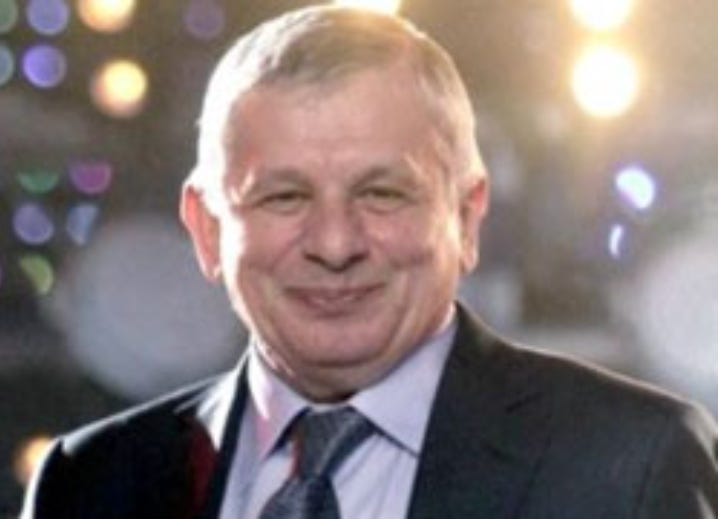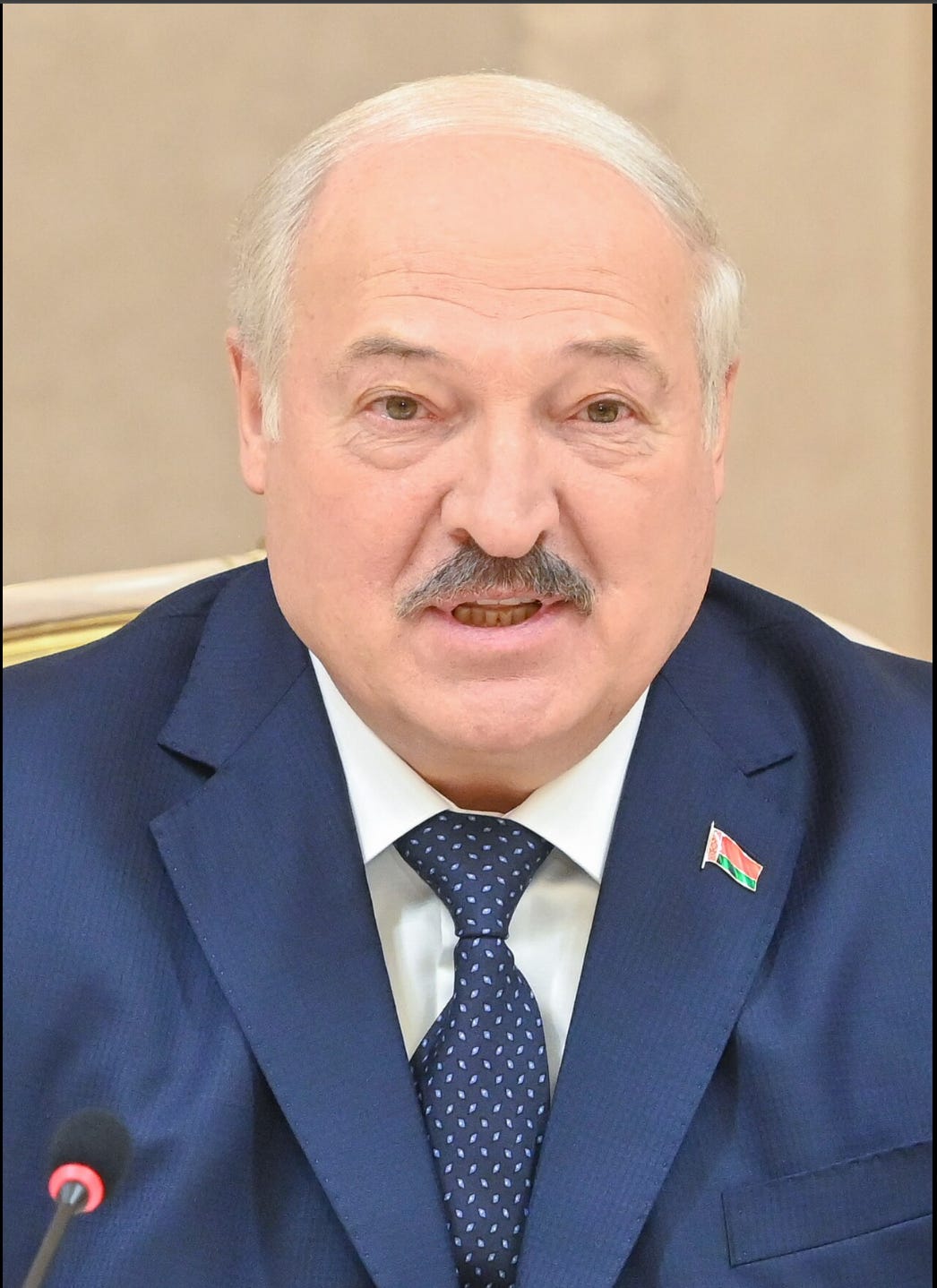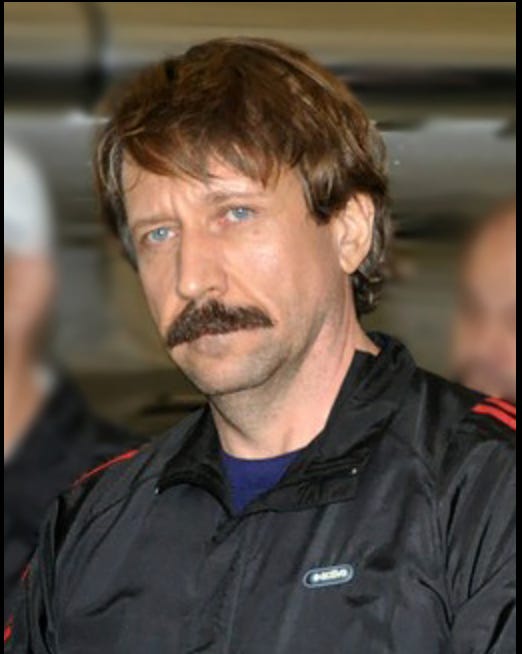The Talented Mr. Peftiev, Part I: How Has a Notorious One-Time Weapons Trafficker and Alleged Crony of Belarus’s Authoritarian Ruler Escaped US Sanctions?
If you guessed because he’s a longtime CIA asset who supplied the agency with weapons for its covert operations and therefore protected, you hit the nail on the head.
Vladimir Peftiev: Philanthropist. Altruist. Arms supplier to the CIA. Photo credit: Wikimedia Commons.
Last April 15, the Treasury Department announced it was sanctioning ten defense industry executives in Belarus due to their close personal ties to President Alyaksandr Lukashenko and their firms’ exports of weapons to Russia for use in its military campaign in Ukraine. The move would strengthen US efforts to hold Lukashenko’s regime “accountable for its complicity in, and profiteering from, Russia’s unjust war in Ukraine,” said Under Secretary of the Treasury for Terrorism and Financial Intelligence Brian Nelson.
Since 2020, when Lukashenko claimed he’d won 80 percent of the votes and a sixth term in office in a highly dubious presidential election, several hundred Belarusian individuals and corporate entities have been sanctioned by the US. They’ve been accused of collaborating in his government’s “violent suppression of its citizens,” enriching themselves through corruption, and, following Moscow’s invasion of Ukraine in early 2022, abetting “Russia’s War Machine.”
Being added to the government’s roster of banned foreign nationals, a designation that’s determined by Treasury’s Office of Foreign Assets Control, is a bright scarlet letter. Those so designated are barred from visiting the US, any assets they own here are subject to seizure, and American citizens are prohibited from conducting business with them anywhere in the world.
For those familiar with Belarus, there’s one baffling omission from OFAC’s list: Vladimir Peftiev, who long ran BelTekExport, a major weapons exporter that during his tenure became known as a global arms supermarket for regimes and guerilla groups that often couldn’t buy military materiel legally. Peftiev was also considered to be one of Lukashenko’s closest allies and served as his personal financial advisor, including on the best means of stashing his assets offshore, according to numerous reports and media accounts.
The arms business and his ties to Lukashenko were evidently highly profitable for Peftiev. He and his family used a network of offshore companies to buy 12 properties in London collectively worth about $25 million, according to a 2020 investigation in The Times.
Peftiev, who lived in Malta for years and has companies based in the United Arab Emirates, has publicly declared he’s no longer in the arms business nor close to Lukashenko, and portrays himself as a philanthropist who lives off of investment income – claims many greet with skepticism. “Publicly, he’s not related to the regime anymore, but I doubt this is true,” Hanna Liubakova, a Belarusian journalist and nonresident fellow at the Atlantic Council, was quoted as saying in a 2021 story in Foreign Lobby Report that raised the question of why the US hadn’t already sanctioned him at that point. “He’s so close to Lukashenko. He’s not a random guy from Abu Dhabi.”
Meanwhile, following Russia’s invasion of Ukraine two years ago, Peftiev has been hit with sanctions by the Swiss government, which called him “a key financial sponsor of the Lukashenko regime;” the Canadian government, which alleged that his activities enabled Russian President Vladimir Putin’s military campaign in Ukraine, which it labeled a “grave breach of international peace and security;” and the Ukrainian government, whose anti-corruption agency charged that he’d helped Lukashenko accumulate illicit wealth.
President Alexander Lukashenko. Having held power for three decades, he’s Europe’s longest ruling leader by a long shot and a dearly beloved figure in Belarus, whose citizens reelected him to a sixth term in 2020 with 80 percent of the votes. What’s not to like? Photo credit: Wikimedia Commons.
Peftiev is clearly concerned about being sanctioned by Washington as well. In June of 2021, he retained Steptoe & Johnson to make sure he stays clear of OFAC’s list. During the following year, Peftiev paid Steptoe $130,000 and while the firm’s lobby disclosure filings haven’t reported new activities since the summer of 2022, he still has it on retainer in the event a fresh, serious threat were to arise.
That’s unlikely for a simple reason that’s never been told other than in a short article I wrote in late 2022 for Paris-based Intelligence Online, which I’m greatly expanding upon here with fresh reporting: During the late days of the Cold War and beyond, Peftiev secretly supplied the CIA with Soviet-made arms it used in covert operations, including equipment the agency passed on to US-backed rebel groups, and to the DIA and other intelligence agencies that ran the Foreign Materiel Acquisition Program (FMA), which procured Russian weapons systems to test against the Pentagon’s hardware and design countermeasures.
That made Peftiev a “valued contact” of US intelligence operatives, a former senior CIA officer who was stationed in Eastern Europe before and after the Berlin Wall came down told me, adding that given his notoriety as a weapons vendor and intimate Lukashenko crony would have led OFAC to carefully scrutinize his history. “He’s never been sanctioned, which means either someone concluded he was clean, which can’t be the case with Peftiev, or they decided to keep him off the list for political reasons, which must be what happened,” the source said. “He’s protected.”
Selling weapons to the highest bidder since 1993
Born in 1957 in Berdyansk, a port city in Ukraine, Peftiev graduated from the Ukrainian State University of Science and Technologies at the age of 21. How his professional career unfolded isn’t entirely clear, but he began working in the arms industry during the Soviet era and quickly rose through the ranks and gained a position of prominence.
After the Soviet Union collapsed and Belarus became independent in 1991, Lukashenko, a loyal regime apparatchik, was appointed to the new nation’s parliament, which was known as the Supreme Council. By 1993, the year before Lukashenko won Belarus’ inaugural post-Soviet presidential election, Peftiev had become part of his inner circle and was authorized to establish BelTekExport, which he held a controlling share in.
Peftiev quickly began vacuuming up vast quantities of Soviet military equipment that was scattered around the former East Bloc and added it to the troves BelTekExport inherited from the USSR, and just as quickly began selling the stockpiles – ranging from Kalashnikovs to tanks to fighter aircraft – to the highest bidder. His firm’s clients reportedly included Iraq, North Korea, Libya, China, and Ivory Coast, as well as a number of militia groups in Africa and Latin America. Led by BelTekExport, Belarus officially sold more than $1 billion worth of military equipment via official channels between 1999 and 2006, making it the world’s 11th biggest weapons exporter during the period.
A cable written the latter year by an official at the US embassy in Minsk, the nation’s capital, disclosed that Czech diplomats had recently provided their American counterparts with a list of the 50 richest Belarusian oligarchs and their estimated net worth. Described by the author as a "Who's Who" of the Lukashenko regime that was deemed to be “highly credible,” the list had Lukashenko in first place with assets worth $9 billion, followed by Peftiev at No. 2 with a fortune of some $900 million.
The cable, which was later made public by Wikileaks, said those on the list “had the opportunity to enrich themselves, and evidence indicates that many did so.” Peftiev’s personal financial interests, the cable stated, had benefited “directly from a number of presidential decrees.”
Another cable written in 2007 revealed that Peftiev had been operating from Malta, one of the world’s top offshore secrecy havens, for much of the previous five years, where the diplomat-writer suspected he’d stashed a portion of Lukashenko’s corruptly-acquired wealth. However, a source had told embassy officials that Lukashenko may have decided to close his bank accounts on the island and “the alleged Maltese money might now be salted away in Venezuela” or Peftiev may have repatriated it to Belarus.
Over the following years, Peftiev diversified his business portfolio and moved into banking, vodka, and telecommunications. He cleverly started a sports gambling company with one of the president’s sons and reportedly appointed Lilia Lukashenko, the wife of another, to be a director of Eastleigh Trading, one of his financial vehicles.
Peftiev’s intimacy with Lukashenko and reputation as the president’s “private banker” allowed him to make a great deal more money by acting as a door opener for foreign firms looking to do business in Belarus. That included Telekom Austria, which purchased the country’s leading mobile phone operator with assistance from Peftiev, who owned a sizable share in the company and was rewarded for his efforts as an intermediary on the deal by being awarded a stake in the successor business.
Peftiev also continued to run BelTekExport, but the firm was becoming increasingly toxic due to its reputation for selling weapons to any government or armed group with enough cash to pay for them, and because of his growing notoriety as Lukashenko’s alleged bagman. In 2010, the State Department penalized BelTekExport for unspecified violations of the Iran, North Korea, and Syria Nonproliferation Act.
The following year, the European Union imposed an embargo on sales to Belarus of “arms and materials that might be used for internal repression,” and sanctioned Peftiev and two companies he controlled, including the gambling firm he cut Lukashenko’s son in on. When EU officials unveiled the measures, which included a freeze on all of Peftiev’s assets, they called him a "key financial sponsor" of the Belarusian regime.
Peftiev hired a top law firm in Lithuania to try to get his assets in the country unfrozen, but suffered further PR damage during the ensuing legal battle. “Vladimir Peftiev's success in arms trade and other businesses can be explained by his close ties with top-ranking officials and security officers,” the Supreme Administrative Court of Lithuania said in a statement issued at a 2013 hearing. It further charged that he had ties to Viktor Bout, the Russian arms trafficker and poster boy of illegal black market deals, who’d been convicted by a US jury two years earlier for illegally peddling anti-aircraft missiles to a terrorist organization.
Peftiev reportedly has fraternal ties with many 5-star individuals, including black market arms dealer Viktor Bout, picture above. Photo credit: Wikimedia Commons.
In a curious ruling in 2014, the European Union Court of Justice repealed the EU sanctions against Peftiev on the grounds that they’d been imposed with insufficient evidence. By then, Peftiev sold his stake in BelTekExport as part of his legal strategy to get his assets unfrozen and ease pressure on the arms exporting firm he’d turned into a giant since founding it two decades earlier.
Whether Peftiev truly ceded all control at BelTekExport remains a topic of dispute, as does the matter of whether or not he’s no longer close to Lukashenko or his government. Either way, it’s hard to understand at first glance how he’s managed to escape being sanctioned in the US to date despite his many years of service to President Lukashenko and the key role he played in turning BelTekExport into a global arms supplier to extremely dubious clients, among them current buyers like Vladimir Putin and former ones, perhaps, such as the CIA.
Coming tomorrow in Part II: How Peftiev got in bed with the CIA and the Florida and Illinois shell companies he created with a motley assortment of covert operatives who were active in Vietnam, Iraq, and points in between, as well as with black market arms traffickers from Eastern Europe who also worked for, and were protected, by US intelligence agencies.





Is Peftiev a member of Erik Prince's Off Leash chat?